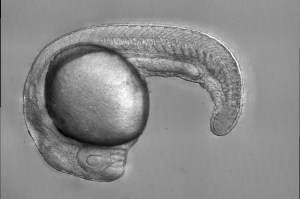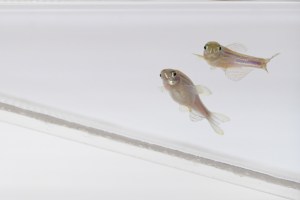Tag: Zebrafish
-
Science & Tech
How mutant protein leads to melanoma
Discovery of new mechanism could have wide implications for other cancers.

-
Science & Tech
Helping to uncover the mechanism controlling brain states
A team of researchers led by two Harvard alumni uncover a switch that controls brain states.

-
Science & Tech
How a zebrafish model may hold a key to biology
Martin Haesemeyer set out to build an artificial neural network that worked differently than fish’s brains, but what he got was a system that almost perfectly mimicked the zebrafish — and that could be a powerful tool for understanding biology.
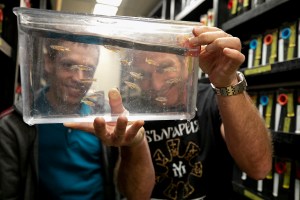
-
Campus & Community
Lab success, life goals
Dalton Brunson’s biology studies have led him to labs, research, and successes that he hopes keep him ever mindful of his commitment to expanding health care in rural areas.

-
Science & Tech
How to feel the heat
A team of researchers was able to show how sensory neurons in the face detect temperature, and how this information is later passed on to the hindbrain of zebrafish, where it is processed to produce behavior.
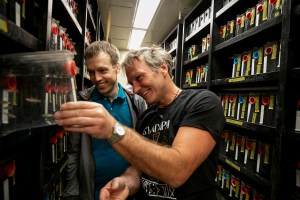
-
Health
Whole brain imaging
New research led by Professor Jeff Lichtman opens a path to deeper insight on brain action behind certain behaviors.
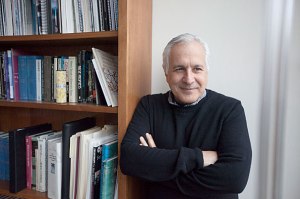
-
Health
Colorful clones track stem cells
Harvard Stem Cell Institute researchers have used a colorful cell-labeling technique to track the development of the blood system and trace the lineage of an adult blood cell traveling through the vast networks of veins, arteries, and capillaries back to its parent stem cell in the marrow.

-
Health
Zebrafish reveal drugs that may improve bone marrow transplant
Using large-scale zebrafish drug-screening models, Harvard Stem Cell Institute researchers at Boston Children’s Hospital have identified a potent group of chemicals that helps bone marrow transplants engraft, or “take.”

-
Health
Imaging captures how blood stem cells take root
Harvard-affiliated researchers have provided a see-through zebrafish and enhanced imaging that offer the first direct glimpse of how blood stem cells take root in the body to generate blood.
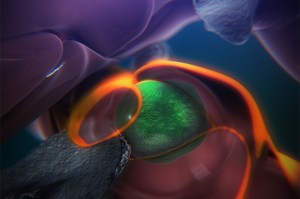
-
Health
Something doesn’t smell right
Harvard scientists say they’re closer to unraveling one of the most basic questions in neuroscience — how the brain encodes likes and dislikes — with the discovery of the first receptors in any species evolved to detect cadaverine and putrescine, two of the chemical byproducts responsible for the distinctive — and to most creatures repulsive…

-
Health
Clues on generating muscles
Harvard stem cell scientists have discovered that the same chemicals that stimulate muscle development in zebrafish can be used to differentiate human stem cells into muscle cells in the laboratory, which makes muscle cell therapy a more realistic clinical possibility.
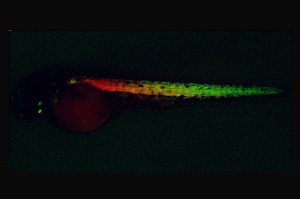
-
Health
Improving cord blood transplants
They began with a discovery in zebrafish in 2007, and now researchers at the Harvard Stem Cell Institute (HSCI) have published initial results of a Phase Ib human clinical trial of a therapeutic that could improve the success of blood stem cell transplantation. This marks the first time that HSCI has carried a discovery from…
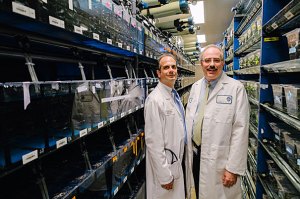
-
Health
Turing was right
Researchers at Harvard have shown that Nodal and Lefty — two proteins linked to the regulation of asymmetry in vertebrates and the development of precursor cells for internal organs — fit a mathematical model first described by Alan Turing six decades ago.

-
Health
Better blood
An innovative experimental treatment for boosting the effectiveness of blood stem-cell transplants with umbilical cord blood has a favorable safety profile in long-term animal studies, according to Harvard Stem Cell Institute scientists at Dana-Farber Cancer Institute, Beth Israel Deaconess Medical Center, and Children’s Hospital Boston.
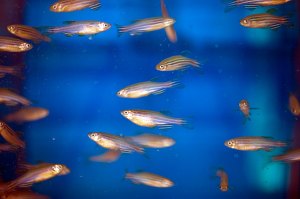
-
Health
Progress against melanoma
Harvard stem cell researchers at Children’s Hospital Boston have taken two important steps toward development of a new way of treating melanoma, the most virulent form of skin cancer.
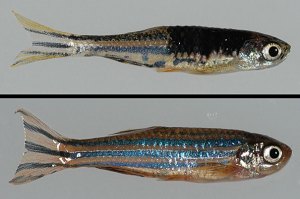
-
Health
Adult kidney stem cells found in fish
It has long been a given that adult humans — and mammals in general — lack the capacity to grow new nephrons, the kidney’s delicate blood filtering tubules, which has meant that dialysis, and ultimately kidney transplantation, is the only option for the more than 450,000 Americans who have kidney failure.
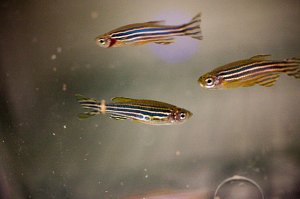
-
Nation & World
Getting down to cases
Business neophytes at Harvard and MIT wrap up the annual case competition, stepping out of their everyday fields to learn about being business consultants.

-
Health
Zebrafish point the way
A new technique for screening drugs’ effects on zebrafish behavior is pointing Harvard University scientists toward unexpected compounds and pathways that may govern sleep in humans.




